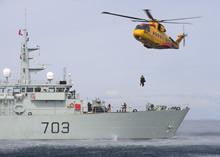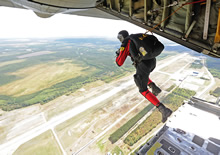About Search and Rescue (SAR)
SAR in Canada: a partnered response
In Canada, search and rescue (SAR) is a shared responsibility. Many partners are involved due to the country’s immense size, range of terrain and weather. The list of partners is made up of government, military, volunteer and industry groups. They all work together to provide SAR services across the nation. This is known as the National Search and Rescue Program.
Canadian Armed Forces involvement
The Canadian Armed Forces (CAF) has the main responsibility for providing SAR from the air. It also coordinates the national response for air and maritime SAR. CAF assets are tasked to respond to about 1000 SAR missions every year.
Provincial and territorial governments are responsible for searches for missing persons including those who are lost or overdue on land or inland waters - commonly known as Ground Search and Rescue (GSAR). They delegate the authority for ground SAR response to the police services in the area. Parks Canada leads ground SAR in federal parks and preserves. The CAF may also help with ground SAR efforts, medical evacuations and other incidents where people are in distress. The provincial, territorial or municipal authority must ask for the help. The Canadian Rangers often help with ground SAR in sparsely settled regions of Canada, upon request.
Maintaining equipment and crews
Successful SAR operations rely on many factors. These include having the right equipment and highly-skilled crews, ready to go out on short notice. Another factor is having SAR resources in the right places and using the right procedures.
CAF SAR assets are carefully managed and strategically located across the country. CAF assets are based where they can effectively respond to SAR incidents in all regions. This takes into consideration where SAR incidents occur the most, how those areas are affected by weather, and making sure there is supporting infrastructure.
Response
CAF SAR crews are on standby 24 hours a day, 7 days a week. The primary SAR crews respond immediately with the professional deftness that is a hallmark of Search and Rescue personnel. The SAR system remains flexible and allows SAR Region Commanders to align response postures so they coincide with periods of greatest SAR activity, such as during the summer months and the opening of fisheries. For 40 hours per week, SAR crews are required to be airborne in less than 30 minutes after a task is received. At all other times, SAR crews must be airborne in less than two hours after a task is received.
SAR Technicians
The CAF has about 140 SAR Technicians (SAR Techs). SAR Techs are men and women who are highly-trained specialists. They help rescue people in distress in remote or hard-to-reach areas. They also provide advanced pre-hospital medical care. SAR Techs are trained to a primary care paramedic national standard.
They also have additional advanced skills. SAR Techs are land and sea survival experts. They specialize in rescue techniques. This includes Arctic rescue, parachuting, diving, mountain-climbing and helicopter rescue.
SAR Techs are present on every CAF primary SAR aircraft that is sent on a SAR mission. They have saved thousands of lives.
Volunteers
The CAF sponsors and funds the Civil Air Search and Rescue Association (CASARA). This is a volunteer organization established in 1985. CASARA helps the CAF respond to incidents that involve air SAR. It makes private aircraft and trained volunteer crews available for SAR missions. They provide both search and communications services.
Links
Department of National Defence
Government of Canada
Regions
News
- HMCS Queen Charlotte sailors always ready to help
Link to External Site / May 11, 2018 - Teamwork beyond borders: Canadian and U.S. search and rescue teams work together
Link to External Site / April 23, 2018
Page details
- Date modified:

























